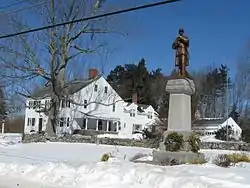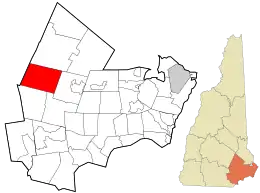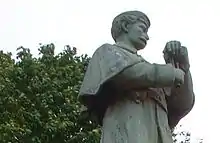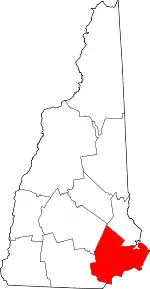Candia, New Hampshire
Candia is a town in Rockingham County, New Hampshire, United States. The population was 3,909 at the 2010 census.[1] The town includes the villages of Candia, Candia Four Corners and East Candia.
Candia, New Hampshire | |
|---|---|
 Civil War monument on High Street | |
 Seal | |
 Location in Rockingham County and the state of New Hampshire. | |
| Coordinates: 43°04′40″N 71°16′36″W | |
| Country | United States |
| State | New Hampshire |
| County | Rockingham |
| Incorporated | 1763 |
| Villages | Candia Candia Four Corners East Candia Bean Island |
| Government | |
| • Board of Selectmen | Susan Young, Chair Brien Brock Boyd Chivers Russell Dann Patrick Moran |
| Area | |
| • Total | 30.6 sq mi (79.2 km2) |
| • Land | 30.3 sq mi (78.5 km2) |
| • Water | 0.2 sq mi (0.6 km2) 0.79% |
| Elevation | 351 ft (107 m) |
| Population (2010) | |
| • Total | 3,909 |
| • Density | 130/sq mi (49/km2) |
| Time zone | UTC-5 (Eastern) |
| • Summer (DST) | UTC-4 (Eastern) |
| ZIP code | 03034 |
| Area code(s) | 603 Exchange: 483 |
| FIPS code | 33-09300 |
| GNIS feature ID | 0873558 |
| Website | www |
History
Settled in 1743, Candia was once part of Chester and known as "Charmingfare", probably because of the many bridle paths or "parades" through the pleasant scenery. Charmingfare was incorporated in 1763 and named "Candia" by Colonial Governor Benning Wentworth, possibly after the old name under Venetian domination of the principal city of Crete, which he had visited after graduation from Harvard. Another account holds, "The town received its present name in compliment to Governor Benning Wentworth, who was once a prisoner on the island of Candia, in the Mediterranean Sea."[2]
Candia was served by the Portsmouth & Concord Railroad, which stretched between its namesake cities. In 1862 the segment between Candia and Suncook was abandoned, coinciding with the opening of a new segment between Manchester and Candia. Therefore, the new line ran from Manchester to Portsmouth via Candia. In 1895 ownership of the line passed to the Boston & Maine Railroad who made it their Portsmouth Branch. Passenger service ended in 1954. The last trains passed through Candia in the early 1980s. The track was abandoned in 1982 and removed between 1983 and 1985. Today the railbed is part of the Rockingham Recreational Trail.
Geography
According to the United States Census Bureau, the town has a total area of 30.6 square miles (79 km2). 30.3 square miles (78 km2) of it is land and 0.2 square miles (0.52 km2) of it is water, comprising 0.79% of the town. Notable villages in the town include Candia proper, near the town's northern border; Candia Four Corners, closer to the geographic center of the town; and East Candia, near the town's eastern border.
Candia is drained by the North Branch River, a tributary of the Lamprey River. The town lies almost fully within the Piscataqua River watershed except for the western and southern edges, which are in the Merrimack River watershed.[3] The highest point in town is Hall Mountain, at 941 feet (287 m) above sea level, located in Bear Brook State Park in the northwestern part of the town. (The main entrance to the state park and most of its facilities are in neighboring Allenstown.)
Candia is bisected by two state highways, Route 43 running north from Route 101 through the Candia Four Corners to the Deerfield town line, and Route 27, running east/west from the Hooksett town line through the Candia Four Corners to the Raymond town line. Route 101 is the major east/west thoroughfare through southern New Hampshire and travels through the south part of Candia.
Adjacent municipalities
- Deerfield, New Hampshire (north)
- Raymond, New Hampshire (east)
- Chester, New Hampshire (southeast)
- Auburn, New Hampshire (south)
- Hooksett, New Hampshire (west)
Demographics
| Historical population | |||
|---|---|---|---|
| Census | Pop. | %± | |
| 1790 | 1,040 | — | |
| 1800 | 1,186 | 14.0% | |
| 1810 | 1,290 | 8.8% | |
| 1820 | 1,273 | −1.3% | |
| 1830 | 1,362 | 7.0% | |
| 1840 | 1,430 | 5.0% | |
| 1850 | 1,482 | 3.6% | |
| 1860 | 1,575 | 6.3% | |
| 1870 | 1,456 | −7.6% | |
| 1880 | 1,340 | −8.0% | |
| 1890 | 1,108 | −17.3% | |
| 1900 | 1,057 | −4.6% | |
| 1910 | 993 | −6.1% | |
| 1920 | 780 | −21.5% | |
| 1930 | 812 | 4.1% | |
| 1940 | 965 | 18.8% | |
| 1950 | 1,243 | 28.8% | |
| 1960 | 1,490 | 19.9% | |
| 1970 | 1,997 | 34.0% | |
| 1980 | 2,989 | 49.7% | |
| 1990 | 3,557 | 19.0% | |
| 2000 | 3,911 | 10.0% | |
| 2010 | 3,909 | −0.1% | |
| 2017 (est.) | 3,928 | [4] | 0.5% |
| U.S. Decennial Census[5] | |||

As of the census[6] of 2000, there were 3,911 people, 1,359 households, and 1,108 families residing in the town. The population density was 129.0 per square mile (49.8/km2). There were 1,384 housing units at an average density of 45.6 per square mile (17.6/km2). The racial makeup of the town was 98.11% White, 0.43% African American, 0.46% Native American, 0.59% Asian, 0.03% Pacific Islander, 0.10% from other races, and 0.28% from two or more races. Hispanic or Latino of any race were 0.87% of the population.
There were 1,359 households, out of which 40.0% had children under the age of 18 living with them, 72.0% were married couples living together, 5.2% had a female householder with no husband present, and 18.4% were non-families. 12.7% of all households were made up of individuals, and 3.2% had someone living alone who was 65 years of age or older. The average household size was 2.88 and the average family size was 3.14.
In the town, the population was spread out, with 26.6% under the age of 18, 6.0% from 18 to 24, 33.6% from 25 to 44, 26.5% from 45 to 64, and 7.2% who were 65 years of age or older. The median age was 38 years. For every 100 females, there were 102.1 males. For every 100 females age 18 and over, there were 102.0 males.
The median income for a household in the town was $61,389, and the median income for a family was $67,163. Males had a median income of $43,260 versus $31,127 for females. The per capita income for the town was $25,267. About 2.3% of families and 2.6% of the population were below the poverty line, including 2.3% of those under age 18 and 5.3% of those age 65 or over.
Education
Candia is part of School Administrative Unit 15, along with Hooksett and Auburn. There is one public school in Candia, the Henry W. Moore School for kindergarten through eighth grade, located near the Candia Four Corners on Deerfield Road. High school education students from Candia attend school outside of the district, currently under contract at Manchester Central High School, but are also in transition for a choice between the Manchester Central and Pinkerton Academy in Derry. Candia is also home to Jesse Remington High School, a private Christian school that offers grades 9-12. Some Candia residents send their children to other private high schools in the area, including Trinity High School in Manchester.
Transportation
Three New Hampshire State Routes cross Candia.
- NH 27 connects Hooksett in the west to Raymond in the east. It is known locally as High Street in the western half of town, and joins Raymond Road just to the east of NH 43.
- NH 43 begins in Candia at an interchange with NH 101, and joins Old Candia Road, following that road until it intersects Main Street, and then heads north on Main Street to the intersection of NH 27, and from there northwards follows Deerfield Road towards the town of Deerfield.
- NH 101 is a freeway that passes through the southeastern part of town, connecting Auburn in the south to Raymond in the east. There is one interchange in town, to NH 43 (Old Candia Road).
Sites of interest
- Fitts Museum, operated by the Candia Historical Society
- Candia Vineyards, an award-winning vineyard with unique varietals
- Charmingfare Farm, a farm and petting zoo
- Candia Springs Adventure Park, formerly Liquid Planet water park
- Stephen Clay Homestead, bed and breakfast
- Candia Woods Golf Links, an 18-hole public golf course. Voted in Golf magazine as New Hampshire's "Friendliest Course"
 Fitts Museum
Fitts Museum McDonald Mill c. 1915
McDonald Mill c. 1915 Gate, Candia Congregational Cemetery
Gate, Candia Congregational Cemetery
Emergency services
Fire and Emergency Medical Services are provided by the Candia Volunteer Fire Department,[7] an all-volunteer department organized in 1925. This department provides fire suppression, rescue, and first-responder Emergency Medical Services to the citizens of Candia and the surrounding communities. The closest hospitals are the Elliot Hospital, a Level Two trauma center, and Catholic Medical Center, one of the most advanced cardiac care centers in New England. Both of these facilities are located approximately 20 minutes away in Manchester. Exeter Hospital[8] is also located about 20 minutes away in Exeter.
Police protection is provided by the Candia Police Department, assisted by the New Hampshire State Police and other local municipal police departments.
Notable people
- Sarah Bagley (1806-1889), labor organizer and reformer
- Harry Cobe (1885–1966), race car driver who ran in the inaugural Indianapolis 500
- Joe Duarte (born 1941), member of the New Hampshire House of Representatives
- Sam Walter Foss (1858–1911), poet
- Albert Palmer (1831–1887), 29th mayor of Boston
- Frederick Smyth (1819–1899), 30th governor of New Hampshire
See also
- New Hampshire Historical Marker No. 141: Sam Walter Foss 1858–1911
- New Hampshire Historical Marker No. 237: East Candia: The Langford District / Candia: One Town, Five Villages
References
- United States Census Bureau, U.S. Census website, 2010 Census figures. Retrieved March 23, 2011.
- Article in Statistics and Gazetteer of New-Hampshire (1875)
- Foster, Debra H.; Batorfalvy, Tatianna N.; Medalie, Laura (1995). Water Use in New Hampshire: An Activities Guide for Teachers. U.S. Department of the Interior and U.S. Geological Survey.
- "Annual Estimates of the Resident Population: April 1, 2010 to July 1, 2017 (PEPANNRES): Minor Civil Divisions – New Hampshire". Archived from the original on February 13, 2020. Retrieved November 15, 2018.
- "Census of Population and Housing". Census.gov. Retrieved June 4, 2016.
- "U.S. Census website". United States Census Bureau. Retrieved 2008-01-31.
- "Home". www.candiavfd.org.
- "Archived copy". Archived from the original on 2006-06-17. Retrieved 2006-05-24.CS1 maint: archived copy as title (link)
